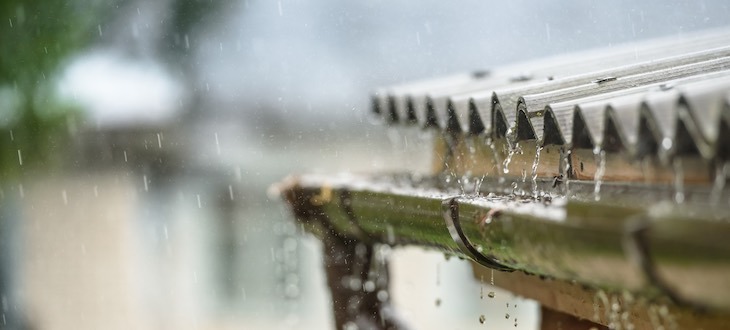Florida is definitely a popular place to live. You can tell just by US Census numbers. From summer 2016 to summer 2017, data shows that 327,811 people became residents of Florida, amounting to almost 900 people per day moving to the Sunshine State.
It is easy to understand why most people love coming to Florida. On the flip side, if you live here, you also know that we have a wide variety of weather that affects humans, buildings, construction, and construction materials:
- Summer heat
- Thunderstorms
- Beach air
- Hurricanes
Sciencing explains that “the combination of moisture, oxygen and salt, especially sodium chloride, damages metal worse than rust does. This combination corrodes, or eats away at, the metal, weakening it and causing it to fall apart. Saltwater corrodes metal five times faster than freshwater does and the salty, humid ocean air causes metal to corrode 10 times faster than air with normal humidity. Bacteria in ocean water also consume iron and their excretions turn to rust”.
3 Types of Protective Coating
To protect your steel from Florida weather and humidity, there are types of protective coating you can use. Here are a few examples:
1. FOZZ
FOZZ is a balanced blend of Phosphoric Acid and other chemicals, wetting agents, and extenders that dissolve rust and prevent further rusting. Properly treated surfaces are ready to paint when dry. FOZZ is not a paint, but a primer that conditions metal so that paint will adhere.
2. Powder Coating
Powder coating is when a dry powder is evenly applied to a clean surface. Then, the object is heated, turning the powder into a thin film. Acrylic, polyester, nylon, vinyl, epoxy, and urethane powders are available. Powders are applied using an electrostatic spray process. The electrically conductive object is sprayed with a charged, non-conducting powder.
3. Organic Coating
A cost effective way to protect against rust is using an organic coating which forms a barrier against corrosive elements. Oil based coatings are ideal for preventing the penetration of water and oxygen.
7 Ways to Prevent Steel From Rusting
Rust can compromise your metals’ strength, making them fragile and shortening their lifespan. When it comes to keeping your metals looking their best while also maintaining durability, preventing rust in the first place is key. Exposure to outdoor conditions is what causes steel to rust and increases the risk of rust, especially if the climate is rainy or humid.
The best ways to prevent rust include:
1. Protective Coatings
Use the protective coatings mentioned above, FOZZ, powder coating, or organic coating.
2. Galvanizing
Galvanizing is a method of rust prevention. This is accomplished through hot-dip galvanizing or electroplating. The iron or steel object is coated in a thin layer of zinc. This stops oxygen and water from reaching the metal underneath but the zinc also acts as a sacrificial metal. Zinc is more reactive than iron, so it oxidizes in preference to the iron object.
3. Corten or Weathering Steel
Use a weathering steel, also known as “COR-TEN” steel which contains up to 21% of alloying elements such as chromium, copper, nickel, and phosphorous. The alloys form a protective rust patina which reduces the corrosion rate with time. COR-TEN steel tends to be cheaper than stainless steel.
4. Stainless Steel
Stainless steel is an alloy and contains a minimum of 11% chromium. This allows the formation of a protective film of chromium oxide which acts as a shield against rust. The protective film will re-form if damaged. Corrosion resistance can be further enhanced with the addition of nickel.
5. Proper Pre-Design
The design should allow air to freely circulate around the metal. Proper planning during the design stage can minimize water penetration and reduce the risk of rust. Crevices and cavities should be avoided. Metal joints should be welded not bolted. If appropriate, drainage holes for water should be considered. For large structures, adequate access should be enabled to allow for regular maintenance.
6. Bluing
Bluing is immersing the steel parts into a solution of potassium nitrate, water, and sodium hydroxide and is a useful technique that offers limited protection for small steel items against rust. The reason it is called “bluing” is because of the blue-black appearance of the finish when using this technique. It is often used in manufacturing firearms to provide a degree of corrosion resistance. It’s also used in fine clocks and other metalwork.
7. Regular Maintenance
If you build in regular maintenance it will help to stop rust forming and halt the progress of any rust that occurred. It’s crucial to remove any rust that has formed. A razor blade can be used for small areas. Using warm water and soap, surface grime should be removed. Then, a rust resistant coating should be applied to the surface.
Visit Tampa Steel & Supply for Ornamental Fencing
Are you in need of steel supplies? Look no further than the professionals at Tampa Steel and Supply. We stock an extensive list of steel products for whatever project you need to tackle. We’re proud to have served our customers for nearly four decades and are ready to assist you with your steel needs. Have questions? Give us a call today to learn more, or stop by our beautiful Tampa showroom.
Request a Quote Online
Or Call Tampa Steel & Supply at (813) 241-2801

